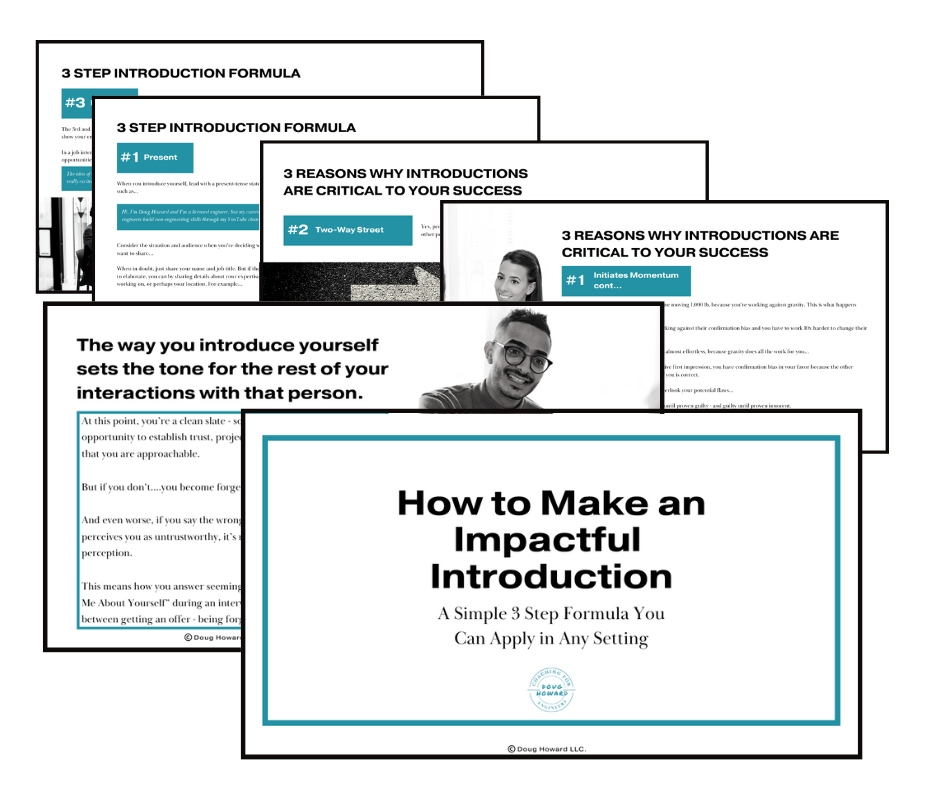Here’s Why You Are Struggling to Navigate Your Engineering Career
In school, you learned how to think like an engineer. But did you ever develop all the skills you need to navigate your career and create the opportunities you deserve?
I'm Doug Howard. I'm a licensed engineer and engineering manager with 15 years of experience successfully mentoring and growing a department of 5 people into 40.
But earlier in my career as an engineer, I relied too heavily on my technical skills.
I ran circles around my peers and I thought it would get me ahead - but the only thing that got me was more work and frustration.
It's why I started this YouTube channel dedicated to helping engineers like you build the right skills to take control of your career and create the opportunities you deserve. My mission is to teach you how to shortcut through the obstacles I faced earlier in my career.
You Might Be Missing This Critical Skill!
Think back to your education - grade school through your highest level of education.
How many classes did you take in Science, Math, Writing, Literature, and History?
Now consider how many classes you've taken related to Listening, Interpersonal Communication, Empathy?
These are the core areas of soft skills - and for most people, you probably haven’t taken many classes in these subjects.
This is fine for people who aren't naturally logical - because it helps them become more balanced.
For example - it forces someone who isn't naturally strong in science or math to develop the ability to take logic into account.
But this type of education system has a different impact on people who are naturally logical, like engineers.
Are You Over-Dependant on Logic?
When the majority of your curriculum is logic-based - without many classes in soft skills to counterbalance (logic) during this developmental stage in your life - it basically teaches engineers to double down on logic and lean on it more heavily.
Now think about engineering school curriculum - Calculus III, Differential Equations, Physics, Thermodynamics.
By the time you graduate from college, you've gone from heavily leaning to over dependent on using logic, and there's little to no room for you to take emotions into consideration.
The main thing to understand is this…
Your natural preference is to consider logic over emotions. But your environment and education taught you to lean heavily on logic - and it also taught you to ignore emotions.
But anything that is learned can be unlearned, and relearned.
As an engineer, you're most comfortable with applying objective logic, and you aren't naturally comfortable with considering emotions - other people's emotions or your own.
This is one of the core reasons why most engineers aren't naturals when it comes to social skills, and it's a problem because…
Soft Skills Matters Most!
When it comes to your career - advancement, growth, opportunities, or pivoting - soft skills matter more than any technical skill. Even for engineers!
Why?
Because your logic and technical skills really don't matter if you can't win the other person over, or convince them that you’re right!
Think you deserve that raise or promotion?
It doesn't matter if your boss disagrees!
Do you believe you’re the most qualified candidate for the job?
It doesn't matter if you can't convince the interviewers!
Do you see what I mean???
Factors like “being correct” or “what's fair” are irrelevant if you can't convince the decision maker.
This was a tough pill to swallow at first…
But relying only on my technical skills was getting me nowhere in my career. So I got over it and started learning how to leverage social skills to my advantage.
I quickly noticed the impact these skills were having in every area of my life - so I started searching for ways to systematize these skills and take it further.
As an engineering manager, I've mentored many engineers - building close relationships and helping them overcome the same obstacles you're facing in your career.
They rarely needed help with technical skills, so I focused more on helping in the areas where they struggled the most - the skills that didn't come natural to them, and that weren't emphasized in school.
And it was typically soft skills
Here’s a Common Misconception About Soft Skills
When it comes to social skills, most people believe that you either got it - or you don't.
I want to clear up this misconception, because it’s 100% false.
Soft skills are a skill - and any skill can be learned by anyone!
But just like learning anything that isn't natural to you - it requires training and temporary discomfort. Similar to learning how to ride a bike…
There's a lot of complexities that go into riding a bike - speed, balance, turning, braking, watching for obstacles and bumps, etc.
But riding a bike isn't a natural motion for humans either - that is, we weren’t born into the world knowing how to ride a bike. It’s a complex skill that requires a lot of fluidity.
Getting on a bike was very awkward and uncomfortable at first. But it got easier each time - and at some point it became automatic, where you're not even thinking about it.
The same correlation is true with engineers and soft skills.
If you're a highly logical engineer - considering other people's perspectives and feelings most likely doesn't come natural to you.
And that's okay - it just means that you need to proactively develop this ability.

